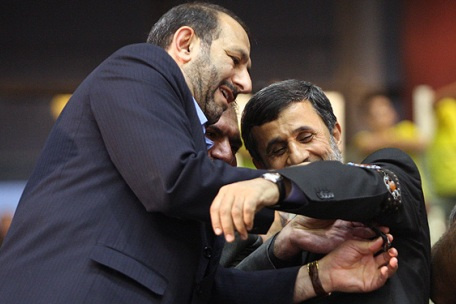Another Parallel Portfolio

About one year after Mahmoud Ahmadinejad made the controversial decision to appoint special diplomatic advisors –a decision explicitly criticized by the Supreme Leader- the Iranian president has created a new portfolio-- deputy for international affairs-- to be filled by his former Executive Deputy Ali Saeedlou –now replaced by Hamid Baqa’ee in his former position. Isn’t this another case of “parallel diplomacy”, to echo the words of Ayatollah Khamenei? Javad Mansouri, former diplomat, discusses the decision with Iranian Diplomacy:
IRD: As you have heard, Ali Saeedlou has been appointed as the president’s deputy for international affairs. Has there been such a portfolio in the administration before?
JM: I have never heard of former presidents having had such a position. Of course they have had ‘advisors’ on foreign or security affairs, who, as you know, take on the task of conveying information or mediating between the president and related organizations. Of course, the definition of Saeedlou’s new position is not clear, so I can’t be sure if he is a deputy or an advisor. It is not clear if Mr. Saeedlou is going to supervise diplomatic interactions of all government-run organizations, or there are other responsibilities prescribed for him.
IRD: According to the Constitution, the president can appoint deputies in fields where there are no ministerial portfolios. Wouldn’t Ahmadinejad's new decision be at odds with the Constitution?
JM: Even if the Constitution had not made that stipulation, there was no need to create a new office. Every minister is also a president’s advisor in his own field. So, the current foreign minister is actually Ahmadinejad's advisor on foreign affairs. If a new position needs to be established, it should be a coordinator to tune the policies of the responsible organizations.
IRD: This is not the first time Ahmadinejad creates offices which run parallel to the foreign ministry. Is it, as some observers say, because of his mistrust of the diplomatic apparatus?
JM: That could be one explanation, and another is that Ahmadinejad wants to advance his singular agenda through any channel possible. But the other point is that for him it is very important that his inner circle do not remain without high-ranking posts-- hence the new position for Ali Saeedlou. Mohammad Aliabadi [former minister of transportation who served as the oil ministry caretaker until recently] may also become a deputy for roads’ affairs. He will receive his own post.
IRD: Another point is that unlike ministers, deputies are relieved of Majles’ supervision. This could also explain Ahmadinejad's decision.
JM: Of course I think it is necessary that the parliament pass a bill that necessitates a vote of confidence for a president’s deputies. Their role is not less than that of a minister. At any rate, I think Majles will react to Ahmadinejad's decision and try to reverse it in some way.
IRD: Just like Mahmoud Ahmadinejad's special advisors, Ali Saeedlou is not familiar with diplomatic issues. Isn’t that a problem?
JM: That is really not a concern for the president. He will enact whatever he decides. Besides, [Foreign Minister] Ali-Akbar Salehi has failed to realize his intentions, and that is why Saeedlou has received this new post.

